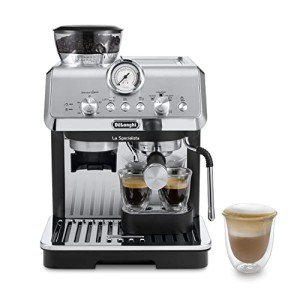Home Use Espresso Machines: A Comprehensive Guide
Espresso machines have ended up being a staple in many households as coffee enthusiasts look for to duplicate café-quality brews in the comfort of their kitchens. The increase in popularity has actually led to a diverse market filled with numerous designs, functions, and rates. This post aims to supply a helpful summary of home use espresso machines, helping readers navigate their alternatives efficiently.
Understanding Espresso Machines
Espresso machines work by requiring hot water through finely-ground coffee under high pressure, resulting in a concentrated coffee beverage understood as espresso. There are several types of espresso machines categorized based upon their brewing methods and level of automation. The most typical types include:
- Manual Espresso Machines: These need the user to manage the pressure and water circulation, permitting a more hands-on coffee-making experience.
- Semi-Automatic Espresso Machines: These offer automatic control over water pressure, while the user by hand grinds and tamps the coffee.
- Automatic Espresso Machines: With the push of a button, these machines instantly manage the circulation of water, making it easier to brew espresso with consistent outcomes.
- Super-Automatic Espresso Machines: These all-in-one machines handle grinding, tampering, brewing, and even milk frothing, making them perfect for users trying to find benefit.
- Pill or Pod Machines: These use pre-packaged coffee pods to produce espresso with very little effort, however they restrict option in developing strategies and tastes.
Table: Comparison of Espresso Machine Types
| Type | Control Level | Alleviate of Use | Cleaning Level | Perfect For |
|---|---|---|---|---|
| Manual | User-controlled | Moderate | High | Coffee purists |
| Semi-Automatic | Partial automation | Moderate | Moderate | Home baristas |
| Automatic | Totally automated | Easy | Low | Busy people |
| Super-Automatic | Fully automated | Extremely simple | Extremely low | Convenience candidates |
| Capsule/Pod | Totally automated | Very simple | Really low | Casual drinkers |
Secret Features to Consider
When choosing a home use espresso machine, it's necessary to think about numerous features that can considerably affect the quality of espresso and user experience.
- Pressure: Look for machines that supply at least 9 bars of pressure, as this is considered ideal for developing espresso.
- Boiler Systems: Single vs. dual boiler systems figure out temperature level stability and the capability to brew espresso and steam milk simultaneously.
- Grinder: Integrated grinders enable newly ground coffee, which boosts flavor. Think about machines with adjustable grind settings.
- Milk Frother: For those who delight in cappuccinos and lattes, an integrated steam wand or automatic frother is important.
- Size and Design: Consider your kitchen space and aesthetic preferences. Machines can be found in various sizes, from compact to large setups.
- Rate: Home espresso machines can vary from a few hundred to numerous thousand dollars, so it's vital to develop a budget before checking out alternatives.
Pros and Cons of Home Use Espresso Machines
| Pros | Cons |
|---|---|
| Convenience of brewing coffee in your home | Initial investment can be high |
| Quality of espresso is typically exceptional | Needs some skill, specifically with manual machines |
| Ability to try out tastes | Maintenance and cleansing can be labor-intensive |
| Can conserve cash in the long run | Not all machines will match every coffee choice |
Upkeep and Cleaning Tips
Maintaining an espresso machine is important for extending its life and making sure consistent brew quality. Here are some useful pointers:
- Regular Descaling: Minerals from water can develop in the machine. Descale every 1-3 months, depending on water solidity.
- Daily Cleaning: Rinse portafilters, baskets, and steam wands after each use to avoid coffee oils from building residue.
- Use Filtered Water: This can help in reducing mineral buildup and improve the taste of coffee.
- Change Gaskets and Seals: These elements might break gradually and must be replaced to keep pressure and efficiency.
- Check out the Manual: Each machine has particular care instructions; following these will guarantee longevity.
Frequently Asked Questions About Home Use Espresso Machines
Q1: What is the very best budget espresso machine?The best budget espresso machine often depends upon private needs, but designs like the DeLonghi EC155 or the Breville Bambino are popular among users for offering terrific value. Q2: How long do home espresso machines typically last?With correct upkeep, home espresso machines can last anywhere from 5 to 15 years, depending on the quality of the machine and frequency of use. Q3: Can I make coffees and lattes with any espresso machine?While most espresso machines can make cappuccinos and lattes, having a trusted
steam wand or frother is vital for attaining the best milk texture.
Q4: Are super-automatic machines worth the investment?For those who prioritize convenience and fast developing, super-automatic machines can be worth the financial investment, though they might lack some customizability in brew strength and taste. Espresso Machines Under £200 : What kinds of coffee beans are best for espresso?While individual choice contributes, beans labeled as" espresso "blends are normally roasted darker, developing rich tastes and a velvety texture when brewed.
Buying a home espresso machine can transform the day-to-day coffee routine into something special, elevating home brews to café quality. By comprehending the various kinds of machines, crucial features to think about, maintenance needs, and weighing the
advantages and disadvantages, consumers can make informed decisions that match their individual choices. As the espresso culture continues to grow, no matter the option, every brew can be a tasty experience waiting to be relished.

